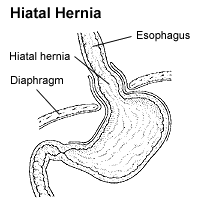Hiatal hernia
(Redirected from Sliding hernia)
Hiatal hernia
A hiatal hernia occurs when a part of the stomach pushes up through the diaphragm and into the chest cavity. The diaphragm is a large muscle that helps with breathing and separates the chest cavity from the abdomen. The opening in the diaphragm through which the esophagus passes is called the hiatus. When the stomach bulges through this opening, it is referred to as a hiatal hernia.
Types[edit | edit source]
There are two main types of hiatal hernias:
- Sliding hiatal hernia: This is the most common type, where the stomach and the section of the esophagus that joins the stomach slide up into the chest through the hiatus.
- Paraesophageal hiatal hernia: This is less common but more serious. Part of the stomach pushes through the hiatus and sits next to the esophagus. This type can lead to more severe complications.
Causes[edit | edit source]
The exact cause of hiatal hernias is not always clear, but several factors may contribute, including:
- Age-related changes in the diaphragm
- Injury to the area
- Persistent and intense pressure on the surrounding muscles, such as from coughing, vomiting, or straining during bowel movements
- Obesity
- Pregnancy
Symptoms[edit | edit source]
Many people with a hiatal hernia do not experience any symptoms. When symptoms do occur, they may include:
- Heartburn
- Regurgitation of food or liquids into the mouth
- Difficulty swallowing
- Chest or abdominal pain
- Feeling full soon after eating
- Shortness of breath
Diagnosis[edit | edit source]
Hiatal hernias are often discovered during tests for other conditions. Common diagnostic methods include:
Treatment[edit | edit source]
Treatment for a hiatal hernia depends on the severity of the symptoms. Options include:
- Lifestyle changes, such as eating smaller meals, avoiding certain foods, and not lying down after eating
- Medications to reduce stomach acid, such as antacids, H2-receptor antagonists, and proton pump inhibitors
- Surgery, in severe cases, to reposition the stomach and repair the hiatus
Complications[edit | edit source]
If left untreated, a hiatal hernia can lead to complications such as:
- Gastroesophageal reflux disease (GERD)
- Esophagitis
- Strangulation of the hernia, which can cut off blood supply to the stomach
Prevention[edit | edit source]
While it may not be possible to prevent a hiatal hernia entirely, certain measures can reduce the risk:
- Maintaining a healthy weight
- Avoiding heavy lifting
- Eating smaller meals
- Avoiding foods and drinks that trigger heartburn
See also[edit | edit source]
References[edit | edit source]
External links[edit | edit source]
Translate: - East Asian
中文,
日本,
한국어,
South Asian
हिन्दी,
தமிழ்,
తెలుగు,
Urdu,
ಕನ್ನಡ,
Southeast Asian
Indonesian,
Vietnamese,
Thai,
မြန်မာဘာသာ,
বাংলা
European
español,
Deutsch,
français,
Greek,
português do Brasil,
polski,
română,
русский,
Nederlands,
norsk,
svenska,
suomi,
Italian
Middle Eastern & African
عربى,
Turkish,
Persian,
Hebrew,
Afrikaans,
isiZulu,
Kiswahili,
Other
Bulgarian,
Hungarian,
Czech,
Swedish,
മലയാളം,
मराठी,
ਪੰਜਾਬੀ,
ગુજરાતી,
Portuguese,
Ukrainian
Navigation: Wellness - Encyclopedia - Health topics - Disease Index - Drugs - World Directory - Gray's Anatomy - Keto diet - Recipes
Search WikiMD
Ad.Tired of being Overweight? Try W8MD's physician weight loss program.
Semaglutide (Ozempic / Wegovy and Tirzepatide (Mounjaro / Zepbound) available.
Advertise on WikiMD
WikiMD is not a substitute for professional medical advice. See full disclaimer.
Credits:Most images are courtesy of Wikimedia commons, and templates Wikipedia, licensed under CC BY SA or similar.Contributors: Prab R. Tumpati, MD




